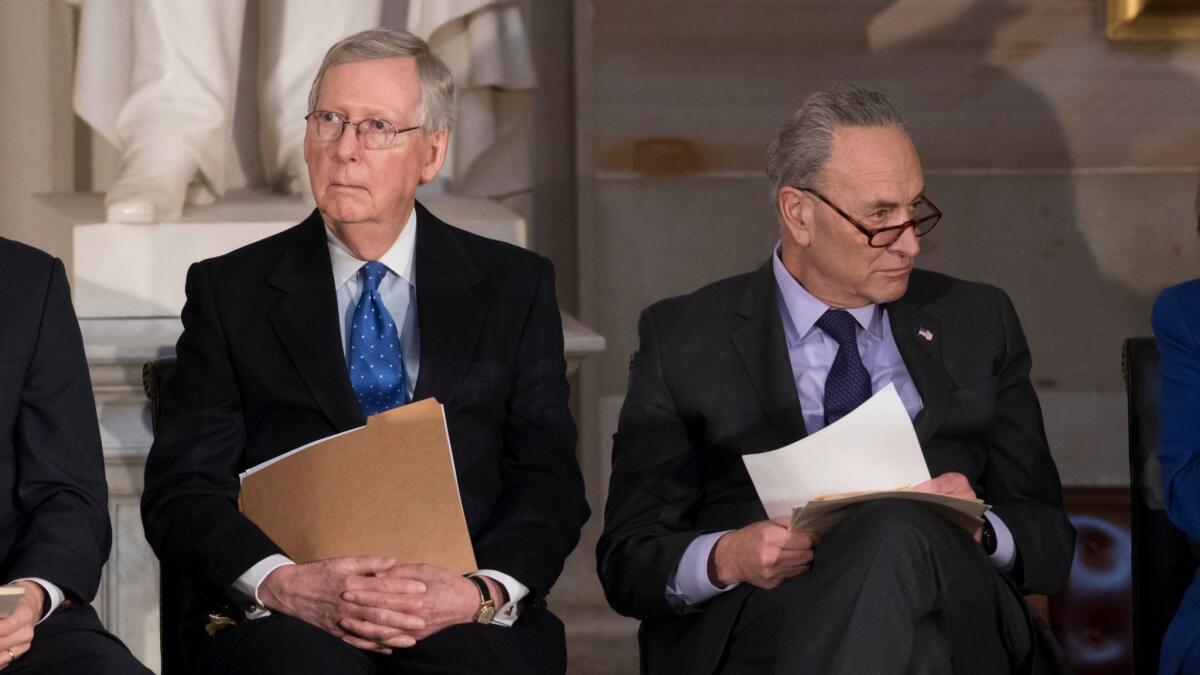Editorial: No, Chuck Schumer isn’t Charlie Brown

- Share via
The deal struck to end the government shutdown Monday leaves Democrats with precious little to show for their efforts. Nevertheless, they were right to sign on, even if it doesn’t bring immediate or certain help to the “Dreamers” at risk of deportation.
Senate Minority Leader Charles E. Schumer (D-N.Y.) called off the filibuster after Senate Majority Leader Mitch McConnell (R-Ky.) promised to consider legislation by early February to extend President Obama’s Deferred Action for Childhood Arrivals program. President Trump announced last year that DACA would end in March, setting the stage for deporting an estimated 700,000 people who arrived in the U.S. as minors and have been living here illegally since before June 15, 2007. There is broad public and congressional support for DACA, yet lawmakers have yet to move a bill to solve the dilemma faced by its participants — the vast majority of whom grew up here and have little or no familiarity with any other country.
For the record:
2:15 p.m. Jan. 22, 2018An earlier version of this editorial said an estimated 800,000 people could be deported if DACA ends in March. The figure is an estimated 700,000.
Even if McConnell keeps this promise — unlike the one he made to Sen. Susan Collins to win her vote for a controversial bill to repeal and replace Obamacare last year — there’s no guarantee the House will take up whatever the Senate passes, or that Trump will sign it. And this White House has been a wholly unreliable negotiating partner on DACA — Chief of Staff John Kelly and advisor Stephen Miller reportedly persuaded the president to put the kibosh on bipartisan deals on DACA that he had invited, even though they included concessions on immigration policy that Trump had demanded.
The dismaying thing about these negotiations is the willingness by both sides to use the Dreamers as pawns, even in the name of protecting them.
That’s why some advocates for the Dreamers complained that Schumer played Charlie Brown to McConnell’s Lucy, accepting a meaningless deal because he clung to the unrealistic hope that history won’t repeat itself. But Schumer didn’t have as much leverage as DACA advocates would like to believe.
Hijacking a must-pass funding bill to solve an unrelated policy dispute is a dangerous and potentially self-defeating strategy. By cutting off pay for federal employees and contractors and putting many federal services on hold, even partial shutdowns like this one have a significant cost for the public and the economy; Standard & Poor’s estimated that the last federal shutdown, in 2013, cost the economy $1.5 billion per day. That pain can reduce public support for the cause that motivated the shutdown in the first place.
At the same time, the side trying to keep the government open (in this case, the GOP) has a strong incentive not to give an inch to those who took the government hostage. Doing so would only encourage more shutdowns. That’s one reason Obama wouldn’t negotiate with House Republicans in 2013 when they refused to pass a stopgap funding bill unless it defunded the Affordable Care Act.
Hostage takers rarely win in this game, and playing it out longer only increases the pain inflicted on everyone else. So the smart thing for Schumer to do under the circumstances was to find a quick way out of the impasse, declare that progress had been made, end the filibuster and look for another way to press the Dreamers’ case.
The dismaying thing about these negotiations is the willingness by both sides to use the Dreamers as pawns, even in the name of protecting them. Despite the widespread agreement that the government should accommodate them (including offering them a path to citizenship), their status has unfairly been bundled together with thornier issues, from Trump’s silly border wall to, more recently, demands for a complete upending of immigration priorities to select immigrants based on merit rather than focusing on family reunification. Those aren’t decisions that should get made under the gun of a quick deadline.
Happily for DACA participants, a federal judge put a freeze this month on Trump’s order to end the program, potentially buying more time for lawmakers to work out a permanent fix. And Senate Democrats have plenty of ways to gum up the works in Washington if McConnell’s promise doesn’t lead to a solution for the Dreamers, preventing Congress from doing just about anything other than keeping the federal government’s lights burning.
But given how Congress has been lurching from one stopgap funding bill to the next, advocates of the Dreamers may simply decide to take the next measure hostage, or the one after that. They shouldn’t have to resort to such tactics, given how many lawmakers on both sides of the aisle say they want a permanent fix for the Dreamers. But with this administration and this Congress, those words hardly seem to matter.
Follow the Opinion section on Twitter @latimesopinion and Facebook
More to Read
A cure for the common opinion
Get thought-provoking perspectives with our weekly newsletter.
You may occasionally receive promotional content from the Los Angeles Times.









